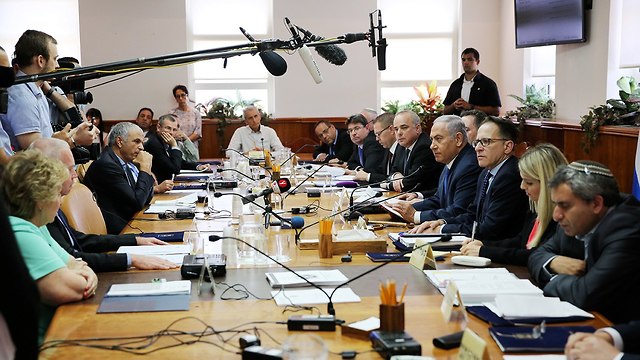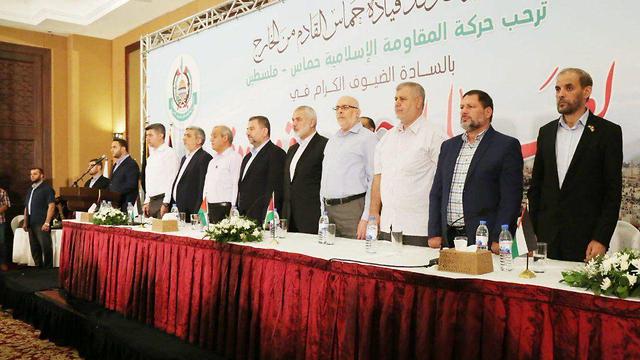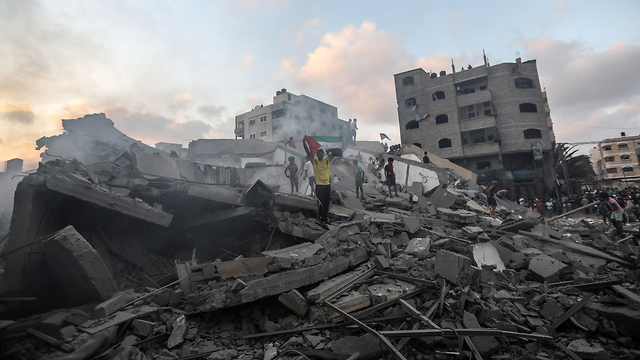Analysis: Israel is interested in postponing any military conflict that is not inevitable as much as possible. This is not a good time for a military conflict, as the smell of elections in the air and a war might leave the electorate with a bitter taste. So the government is trying to stall for time.
So who of the two expresses the Israeli government’s policy in the Gaza Strip? Is it Lieberman from Monday, who declared standing in front of the Gaza border fence that a military conflict is not a question of “if” but rather of “when,” or Lieberman from Tuesday, who declared the reopening of the Kerem Shalom border crossing and the expansion of the Gaza fishing zone to 9 nautical miles? Seemingly, there’s a contradiction here. Because you don’t give oxygen to an enemy you know for a fact could attack you at any moment.
The majority of Cabinet members maintain the same position as Monday’s Lieberman. Defense officials believe that a military conflict with Hamas, under the current conditions, is inevitable. So where did that senior Israeli official, who told the Washington Post Israel was close to an agreement with Hamas, come from? And he’s not alone. Hamas, whose representatives are currently in Cairo for discussions on the deal, is also leaking to the press that an agreement is imminent. UN envoy Nickolay Mladenov’s team is also saying that a deal is just around the corner. So there is no wonder the behavior of the Israeli government—which is talking about sending goods into the strip and expanding the Gaza fishing zone—only increases the suspicion it’s not telling us the whole truth.

And indeed, it has been a bit hard for the government to tell us the whole truth, because this story entails a lot of diplomatic maneuvering and political deception. Since the last round of hostilities—which began last Wednesday with rocket fire and ended on Friday with rioting on the border—Israel has been under intense international pressure to halt fire and not extend the armed conflict further.
Discussions in the defense establishment and the Prime Minister’s Office left the impression that in the current climate, Israel has no international legitimization to escalate the military blows on the Gaza Strip. Furthermore, Hamas has been keeping a low profile, with the number of incidents on the border and incendiary balloons dropping significantly.
Since the Israeli government has no clear and agreed policy on the Palestinian issue in general and on the Gaza issue in particular, it’s convenient for it to once again stick to its traditional position: Let’s earn another day, get more time. Stopping the strikes and easing the economic pressure will show the world Israel is not seeking war—on the contrary. Not only is Israel willing to hold its fire, it is also willing to move towards the rehabilitation of the strip. And so, if this coming Friday, or in a week or a month, Hamas violates the quiet, Israel would have the international legitimization to strike, and strike hard. In such a situation, the internal consensus in Israel to attack Gaza will increase. After all, we tried. We did everything to make the fire stop, but they struck.

In general, Israel is interested in postponing any military conflict that is not inevitable as much as possible. This is not a good time for a military conflict, as the smell of elections in the air and a war might leave the electorate with a bitter taste. So the government is trying to stall for time, maneuver, improve its position.
And just as importantly: Politically, the current Israeli government cannot admit to having direct talks or an agreement with Hamas. As soon as that happens, the Cabinet ministers will turn on each other. So even if there was an ounce of truth in the reports about an imminent agreement with Hamas—no one will admit to it. Certainly not on the eve of elections.
The idea of a long-term agreement is a process Egypt has been pushing for ten months now. It centers on returning control over the Gaza Strip to the Palestinian Authority—a precondition for a broader Israeli-Palestinian agreement in the distant future. Over the past two weeks, Yahya Sinwar, the Hamas leader in the strip, has changed strategies. He no longer wants the PA in Gaza and is not too excited about the Egyptian plan. Now, he’s talking about a separate agreement with Israel, in return for terms Israel is not even willing to hear—like a port in Gaza, for example. This doesn’t stop the Egyptians and Mladenov from believing the latest truce reached on the Gaza border is a good and optimistic opening for a broader agreement with Israel and the rehabilitation of the strip.

At the moment, there is no written, accepted or signed agreement between Israel and Hamas, and in any case there’s no supervisory mechanism to complain to about any violations of such an agreement. So what do we have? Calm, as Hamas claims? A short temporary truce under test, as Israel says? The beginning of a long-term agreement, as the Egyptians and the UN believe? All answers are correct. It’s all in the eyes of the beholder.
In any case, Israel has already decided: If the Palestinians resume their rioting on the border on Friday and go back to launching incendiary balloons, Kerem Shalom will be closed again, the Air Force will operate, and we will be searching for a new definition for the current state of affairs.
As reported by Ynetnews
